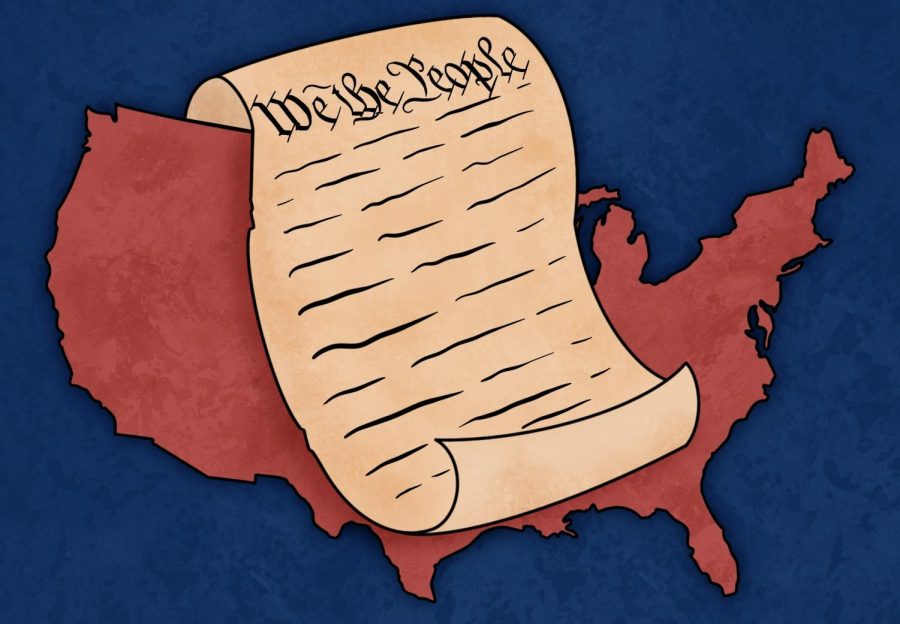With election season in full swing, many voters have been questioning whether the Electoral College is beneficial for the United States’ democratic elections. Vice Presidential candidate Tim Walz remarked this past week at a fundraiser hosted by California Gov. Gavin Newsom, “I think all of us know the Electoral College needs to go.”
Initially designed to be a compromise between an election by popular vote and an election decided by senators and representatives, the Electoral College was written into the Constitution by the founding fathers. Article II and the 12th Amendment set the stipulations for Electors and the process by which the elections for president and vice president should be conducted. “Each State shall appoint … a Number of Electors, equal to the whole Number of Senators and Representatives to which the State may be entitled in the Congress.”
At first glance, this system seems fairly balanced, with each state receiving its number of House Representatives based on population, plus two for the Senate members. However, when broken down, the proportion of electoral votes to the population in rural states is lower, meaning citizens of those states have more voting power.
Wyoming for example, with a total population of less than 600,000, has three electors. California on the other hand, has around 67 times more people than Wyoming but only receives 54 votes. This means an individual’s vote counts 3.6 times more in Wyoming than in California.
This disparity between rural and more densely populated states has led to pigeonholing parts of the country as “red” or “blue” rather than the melting pot of values that the United States was once known for. Misconstruing these places for political ideologies does nothing but divide people. A popular vote would remove the labels and stigma surrounding parts of the country and guarantee each vote is valued the same.
Due in part to the results of the 2016 election, there has been growing support for a direct popular vote among the public. For instance, POLITICO and Morning Consult conducted a poll in March 2019 that found 50% of respondents wanted a switch to the popular vote, with 34% saying they did not. This attitude toward the Electoral College has no doubt been influenced by the fact that two of the last five elections saw the winner of the popular vote lose the Electoral College.
Tim Walz summarized this point of view when he said, “[People] have to feel [that] every vote counts in every place of the country.”
The American Bar Association has also criticized the Electoral College as an “archaic” and “ambiguous” system, with polls indicating that 69% of lawyers favored abolishing it in 1987. Public opinion polls have also shown Americans favor abolishing it by a vast majority: 81% in 1968; and 75% in 1981. Despite all this, the Electoral College continues to thrive.
This sentiment for a direct popular vote is also growing disproportionately along party lines. An NBC News and Wall Street Journal poll confirmed that 53% of Americans shared their support for a move to popular vote, but the results also showed an overwhelming 78% of those who voted for Hillary Clinton in 2016 believed a popular vote should be adopted against an equally overwhelming 74% of Trump voters say the Electoral College should stay.
The institution has been at the heart of political controversy in the United States for just as long as it has been around. In the past 200 years, there have been more proposals on changing the Electoral College than any other subject. In fact, more than 700 proposals have been introduced to either reform or eliminate the Electoral College. Unfortunately, the Electoral College is written in a notoriously difficult document to change, requiring a constitutional amendment for reform. Though the process seems daunting, the Electoral College was nearly abolished by Congress in 1934 but fell short by two senate votes. Again in 1979, a Senate vote to establish a direct public vote fell short by just three votes.
Currently, 17 states and Washington, D.C. have joined what is called the National Popular Vote Interstate Compact. When a state passes legislation to join the National Popular Vote Compact, it pledges that all of its electoral votes will be given to whichever presidential candidate wins the popular vote nationwide, rather than the candidate who actually won the state.
After hundreds of missed attempts, it is time to make a substantial move toward a direct popular vote or seriously reform the outdated Electoral College before its failures lead to a constitutional crisis.







